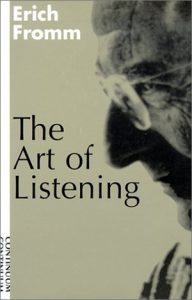The Art of Listening

Author: Erich Fromm
Publisher: Constable
Year of Publication: 1994
Print Length: 192 pages
Genre: Non-Fiction / Popular Science, Philosophy, Psychology
Topic: Active Listening, Humanism, Love, Psychoanalysis, Psychosocial, Culture & Society
Although Erich Fromm intended to publish his work as a practicing psychotherapist, these plans were never realized in his lifetime. This volume fulfills his wish. Not intended as a textbook about psychoanalytic therapy, these reflections provide welcome new information about Fromm the therapist and the way he dealt with the psychological suffering of his patients. As Fromm envisioned, each chapter is structured to capture the informality and intimacy of his psychoanalytic work so that readers get a new and different sense of Fromm’s humanism, honesty and insight. These talks and seminars, given by Fromm between 1964 and his death in 1980, deal with the issues between analyst and analysand that go to the heart of the psychoanalytic process. For Fromm, the analyst is his or her own next patient, as the patient becomes his or her analyst.
Table of Contents
Editor’s Foreword
I. FACTORS LEADING TO PATIENT’S CHANGE IN ANALYTIC TREATMENT
1. Curing Factors According to Sigmund Freud and My Critique
2. Benign and Malignant Neuroses—with a Case History of Benign Neurosis
3. Constitutional and Other Factors for Cure
II. THERAPEUTIC ASPECTS OF PSYCHOANALYSIS
4. What is Psychoanalysis?
5. Preconditions for Therapeutic Care
6. Factors Leading to Therapeutic Effect
7. About the Therapeutic Relationship
8. Functions and Methods of the Psychoanalytic Process
9. Christiane: A Case History with Remarks on Therapeutic Method and on Understanding Dreams
10. Specified Methods to Cure Modern Character Neuroses
11. Psychoanalytic “Technique”—or, the Art of Listening
Bibliography
Index

Erich Fromm (1900-1980) was a German-born American psychoanalyst and social philosopher who explored the interaction between psychology and society. By applying psychoanalytic principles to the remedy of cultural ills, Fromm believed, mankind could develop a psychologically balanced “sane society”. In several books and essays, Fromm presented the view that an understanding of basic human needs is essential to the understanding of society and mankind itself. Fromm argued that social systems make it difficult or impossible to satisfy the different needs at one time, thus creating both individual psychological and wider societal conflicts.
Source: https://www.britannica.com/biography/Erich-Fromm
More from Erich Fromm in this library, click here.
